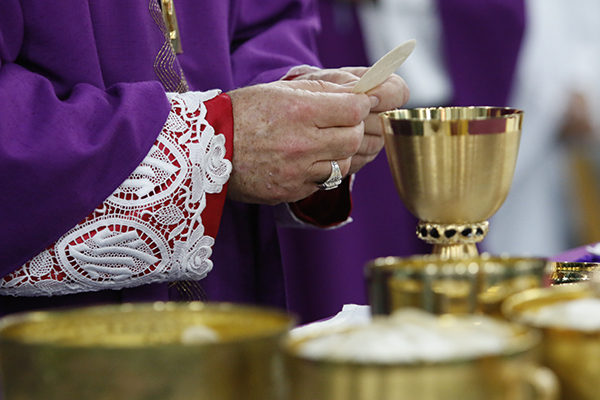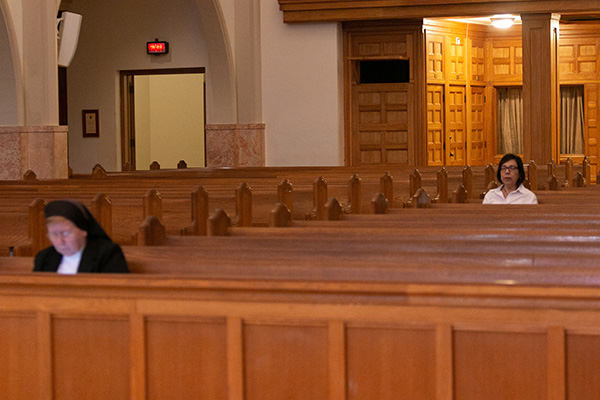By Ana Rodriguez Soto - The Archdiocese of Miami
MIAMI | In a recent letter to archdiocesan priests, Archbishop Thomas Wenski tries to answer the question: When can we resume the normal liturgical life in our parishes?

Photographer: ANA RODRIGUEZ-SOTO | FC
Archbishop Thomas Wenski prays over the consecrated bread and wine during an Ash Wednesday Mass at Archbishop McCarthy High School in 2016. Florida's bishops are trying to figure out how to resume the public celebration of Masses without contributing to the spread of the coronavirus or endangering the lives of parishioners who may become ill with COVID-19.
“I know all of you are anxious to do so,” the archbishop wrote in his April 20, 2020 letter. “However, after consulting with civil authorities, we are not yet able to resume ‘public assemblies.’”
The archbishop then points out questions that need to be answered before resuming “normal liturgical life,” as he predicts that “social distancing will be part of the new normal” until a coronavirus vaccine is available.
Those questions include:
- Would churches need to take each congregant's temperature before admitting them into the assembly?
- If people must be spaced six feet apart, what do churches do with "overflow”?
- Or do churches admit only a certain number of parishioners who RSVP confirming their attendance?
- Would everybody in church be required to wear a mask, since singing, or even talking, can spray droplets from someone's mouth?
- Would the priest and others distributing Communion be required, for their protection, to wear a mask and gloves during distribution?
- Would the pews have to be sanitized before and after every Mass?
Finally, churches would have to continue to encourage the elderly and those with underlying health conditions to stay home and self-isolate. That includes a significant number of priests, deacons and extraordinary ministers of holy Communion. “So the archdiocese and parishes may have to make provisions to relieve them,” Archbishop Wenski wrote.
Complicating all this, he added, is “the lack of appropriate testing that is accurate, quick and cost effective,” in order identify those who are asymptomatic but infectious.
“As you can see, these are difficult hurdles for us to navigate as we emerge on the other side of this crisis,” the archbishop wrote.
PANDEMIC EPICENTER
He noted that Miami-Dade, Broward and Palm Beach counties are the “epicenter of the pandemic” in Florida, accounting for over half of the infections statewide (20,969 out of a total of 35,463 as of May 1) and over half of the deaths (766 out of a total of 1,364). As such, the three counties were excluded from Gov. Ron DeSantis’ call for a “phase one” re-opening of most of the state beginning May 4. (The Archdiocese of Miami encompasses Miami-Dade, Broward and Monroe counties.)
The archbishop noted that social distancing and stay-at-home measures seem to have “flattened the curve” so far. But in a follow-up letter sent out May 2, he reiterated that “until there’s a vaccine we (all) risk catching the virus sooner or later. For many, especially someone in relative good health, it will be at best an unpleasant experience; for those with underlying conditions, catching the virus could prove to be much more dangerous.”

Photographer: ANA RODRIGUEZ-SOTO | FC
Two staff members, seated rows apart, are the only ones present at Miami's St. Mary Cathedral as Archbishop Thomas Wenski celebrated Palm Sunday Mass in the midst of the coronavirus pandemic, April 5, 2020. How will parishes maintain social distancing once Masses with a congregation resume, given the fact that a coronavirus vaccine is months away from development and widespread distribution?
Florida’s bishops are thinking along the same lines. They hold a conference call every Monday to decide on a course of action and work through all the contingencies.
Bishop William Wack of the Diocese of Pensacola-Tallahassee posted an update April 30 in which he stressed that even when Masses with the congregation resume “no one should expect to be able to attend Mass with regularity” given the need to maintain social distancing. And, he added, even if churches follow the best health practices, anyone who attends public Mass needs to understand that they “will still be at risk.”
Bishop Gregory Parkes of the Diocese of St. Petersburg, in a message also posted April 30, said, “My hope is to resume public Masses within the month of May. One possibility that I am exploring is to first begin with public worship Monday through Saturday when fewer people typically attend Mass.
“I am not sure if this will happen just yet, but there is one thing I do know with certainty. When we return to our churches, we should all expect changes at Mass, to ensure everyone’s health and safety, which is a top priority,” Bishop Parkes said.
GRADUAL REOPENING
On May 1, the Diocese of Orlando announced a gradual reopening of most churches beginning May 11, with people allowed to come and pray and receive the sacrament of penance. Daily Masses open to parishioners will resume May 18, but Sunday Masses will not be celebrated with the public until the weekend of May 30-31.
Chapels and adoration chapels will remain closed throughout the month, as will the Basilica of the National Shrine of Mary, Queen of the Universe, located near Disney World.
At each stage, the Orlando guidelines stress that “people may be denied entrance upon arrival or asked to leave the church if the numbers become greater than social distancing would allow.”
“Our goal is, of course, to reunite our people with Mass and the regular participation in the sacraments,” Archbishop Wenski wrote in this April 20 letter. But other parts of Florida, such as Arcadia or Lake City, “do not face the same challenges we face” in South Florida.
“Neither does Las Cruces,” he added, referring to the first diocese in the U.S. to announce the resumption of Masses, the diocese headed by Miami’s former auxiliary, Bishop Peter Baldacchino.
“Until there is a vaccine, the coronavirus will continue to infect people,” Archbishop Wenski wrote. “Most people will recover, some will die. But we do not want to be responsible for a greater spread.”
In that April 20 letter, the archbishop also answered some of the questions local Catholics continue to ask about the “closing” of churches. You can read those questions and answers in our updated Coronavirus Q and A, available here.


Comments from readers